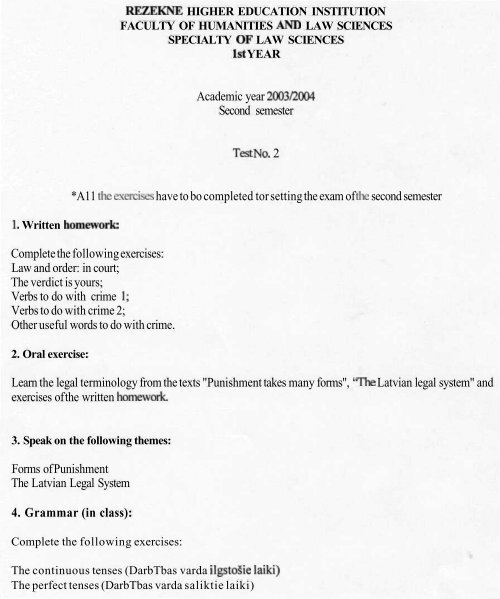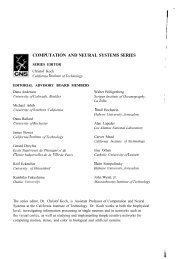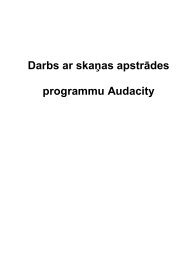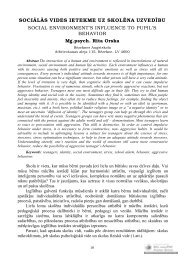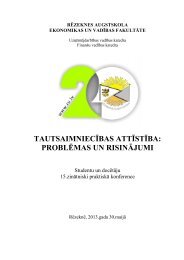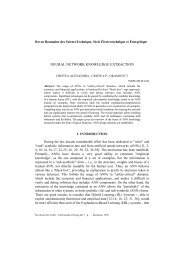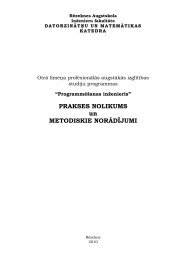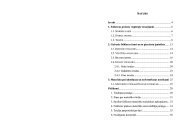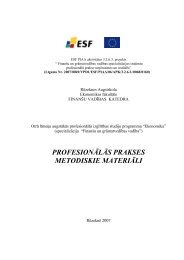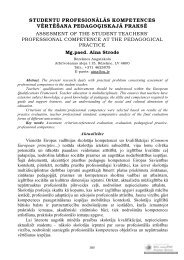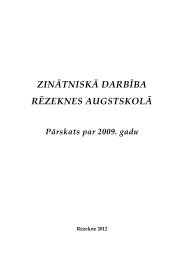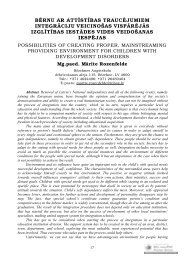Academic year 2003/2004 Second semester Test No. 2 *A11 the ...
Academic year 2003/2004 Second semester Test No. 2 *A11 the ...
Academic year 2003/2004 Second semester Test No. 2 *A11 the ...
- No tags were found...
You also want an ePaper? Increase the reach of your titles
YUMPU automatically turns print PDFs into web optimized ePapers that Google loves.
REZEKNE HIGHER EDUCATION INSTITUTIONFACULTY OF HUMANITIES AND LAW SCIENCESSPECIALTY OF LAW SCIENCES1st YEAR<strong>Academic</strong> <strong>year</strong> <strong>2003</strong>/<strong>2004</strong><strong>Second</strong> <strong>semester</strong><strong>Test</strong> <strong>No</strong>. 21. Written homework:<strong>*A11</strong> <strong>the</strong> exercises have to bo completed tor setting <strong>the</strong> exam of tlie second <strong>semester</strong>Complete <strong>the</strong> following exercises:Law and order: in court;The verdict is yours;Verbs to do with crime 1;Verbs to do with crime 2;O<strong>the</strong>r useful words to do with crime.2. Oral exercise:Learn <strong>the</strong> legal terminology from <strong>the</strong> texts "Punishment takes many forms", "The Latvian legal system" andexercises of <strong>the</strong> written homework.3. Speak on <strong>the</strong> following <strong>the</strong>mes:Forms of PunishmentThe Latvian Legal System4. Grammar (in class):Complete <strong>the</strong> following exercises:The continuous tenses (DarbTbas varda ilgstoSie laiki)The perfect tenses (DarbTbas varda saliktie laiki)
1. Written homework:Complete <strong>the</strong> following exercises:Law and order: in court;The verdict is yours;Verbs to do with crime 1;Verbs to do with crime 2:O<strong>the</strong>r useful words to do with crime.Law and order: In courtFill in <strong>the</strong> missing words in <strong>the</strong> passage below. Choose from <strong>the</strong>following and note that two of <strong>the</strong> words are used twice.accusedacquittedbarristersCrown CourtdefencedockevidencefineguiltyimprisonmentjudgejuryJustice of <strong>the</strong> PeaceMagistrates Courtoathprosecutionput on probationsentencetestimonytrialverdictwitness boxwitnessesThere are two main courts of law in Britain - <strong>the</strong> (1)for minor offences, such as speeding, shoplifting, etc. and <strong>the</strong>(2) for more serious offences such as fraud andmurder. The magistrate or (3)who tries cases in <strong>the</strong>lower court does not have special education or training in law anddoes not get a salary. (The job is voluntary and part-time.)At a (4) at a Crown Court, <strong>the</strong> (5) ordefendant stands in <strong>the</strong> (6)while lawyers question(7) who have to say what <strong>the</strong>y have seen or know andwho stand in <strong>the</strong> (8)They have to swear an(9) to 'tell <strong>the</strong> truth, <strong>the</strong> whole truth and nothing but<strong>the</strong> truth.' What <strong>the</strong>y say is known as <strong>the</strong>ir (10)There are usually two lawyers or (11) _ in <strong>the</strong>courtroom. One is known as Counsel for <strong>the</strong> (12) ,who speaks for <strong>the</strong> defendant, and <strong>the</strong> o<strong>the</strong>r as Counsel for <strong>the</strong>(13) This person has to try to prove that <strong>the</strong> personaccused of <strong>the</strong> crime really committed it.The (14)sits in a large seat facing <strong>the</strong> defendantand wears a special gown and wig. He or she does not decidewhe<strong>the</strong>r an accused person is guilty or not. This is left to <strong>the</strong>(15) , made up of twelve members of <strong>the</strong> public, to72
decide. During <strong>the</strong> trial <strong>the</strong>y sit in silence, listening carefully to all<strong>the</strong> (16)Then, <strong>the</strong>y are locked away until <strong>the</strong>ycan decide whe<strong>the</strong>r <strong>the</strong> person is (17)or not(18) This decision is called <strong>the</strong> (19)The (20) now decides <strong>the</strong> punishment or(21) as it is called. If <strong>the</strong> person is innocent, he or sheis (22), which means that he or she is releasedimmediately and is free to go home. If <strong>the</strong> person is guilty and <strong>the</strong>crime is serious, he or she could be given several <strong>year</strong>s(23) However, if it is a first offence, <strong>the</strong> person mightbe given a (24)instead, for example £1,000, or(25)The verdict is yoursWork in pairs or groups of three. You are going to be judges. Readthrough <strong>the</strong> list of crimes below and <strong>the</strong>n decide <strong>the</strong> type of sentenceyou think <strong>the</strong> person ought to get. Before starting, here is a list ofpossible sentences. You can choose from <strong>the</strong>se or decide on your own.The death penaltyYou could sentence <strong>the</strong> person to death (by hanging, <strong>the</strong> deathchamber, electric chair, guillotine, etc.) <strong>No</strong>te: <strong>the</strong> death penaltyhas been abolished in <strong>the</strong> U.K.Life imprisonmentYou could imprison <strong>the</strong> person for life.ImprisonmentYou could imprison <strong>the</strong> person for a set period (decide how manymonths or <strong>year</strong>s).FinesYou could fine <strong>the</strong> person (decide <strong>the</strong> amount).Put on probationYou could put <strong>the</strong> person on probation, e.g. for 3 <strong>year</strong>s. (Thismeans you don't go to prison. Instead you have to keep out oftrouble and report to a probation officer every week during <strong>the</strong>period of <strong>the</strong> sentence.)73
74Suspended sentenceYou could give <strong>the</strong> person a suspended sentence, e.g. 2 <strong>year</strong>ssuspended sentence. (This means <strong>the</strong> person is given a two <strong>year</strong>prison sentence but only has to serve it if he or she commitsano<strong>the</strong>r crime during that period.)Acquit I let offYou could let <strong>the</strong> person off with a caution.Do community serviceYou could give <strong>the</strong> person community service. (He or she has todo socially useful work, e.g. helping handicapped children or oldpeople instead of going to prison).Driving ban I endorsementIf a driving offence, you could ban <strong>the</strong> person from driving(decide how long) or endorse his or her licence, which means thatyou mark in it that <strong>the</strong> person has broken <strong>the</strong> law.01 A person who robbed a shop and wounded <strong>the</strong> owner with aknife.2 A person who set fire to his or her flat for <strong>the</strong> insurance money.3 A person in <strong>the</strong> Government who has been spying for a foreignpower.4 A person who took a bar of chocolate from a shop without payingfor it.5 A person who bought a camera with a false cheque.6 A person who murdered a policeman in cold blood.7 A person who kidnapped a small child and held him to ransom.(The child was unhurt.)8 A person who hi-jacked a plane. In <strong>the</strong> rescue attempt onepassenger died of a heart attack.9 A person caught selling cocaine and heroin.10 A person who saw a woman being attacked, went to her aid andaccidentally killed her attacker.11 A person who refuses to do military service.12 A person who stole a car, <strong>the</strong>n crashed into ano<strong>the</strong>r one,seriously injuring <strong>the</strong> driver.13 A football supporter who threw a brick at a referee during afootball match. (The brick struck <strong>the</strong> referee on <strong>the</strong> leg.)
14 A person who drove through a traffic light when it was showingred.15 A person who got married when he already had a wife.When you have finished, compare your verdicts with o<strong>the</strong>r pairs orgroups.Verbs to do with crime 1Match <strong>the</strong> verbs on <strong>the</strong> left 1-16 with a suitable phrase a-p. Writeyour answers in <strong>the</strong> boxes on <strong>the</strong> next page.1 accuse someone a in cold blood2 arrest someone b into custody3 ban c a witness4 break d telephone boxes5 charge someone e for armed robbery6 commit f a prison sentence7 cross-examine g a case75
8 hijack9 hold up10 murder someone11 pinch12 serve13 sound14 take someone15 try16 vandalizeh with murderi smoking in public placesj of shopliftingk <strong>the</strong> alarm1 a crimem some moneyn a planeo <strong>the</strong> lawp a bank1 2 3 4 5 6 7 8 9 10 11 12 13 14 15 16Verbs to do with crime 2Fill in <strong>the</strong> missing verbs in <strong>the</strong> sentences below. Choose from <strong>the</strong>following and make any changes where necessary. Use each verbonce only.acquitassaultblackmailburgleconvictdefrauddeportdouble-crossembezzleimprisoninterrogatekidnapmugpilferprosecuteprovereprieverobshopliftsmugglesueswindlethreatentrespass
1 An armed gang <strong>the</strong> Kingsway Road branch ofBarclays bank yesterday afternoon and got away with nearly£90,000.2 The salesman was very persuasive and managed to<strong>the</strong> elderly couple out of <strong>the</strong>ir life savings.3 Tourists have been advised to avoid going off into <strong>the</strong> mountainsas six people have beenin <strong>the</strong> past month. As yet,no-one has been freed.4 The man was from Britain to Germany where hewill face charges of terrorism and murder.5 The youths were fined £300 for on Governmentproperty and deliberately causing damage to expensivemachinery.6 She had pleaded not guilty throughout <strong>the</strong> trial, so it was a reliefwhen <strong>the</strong> jury finally • her.7 The judge him for ten <strong>year</strong>s for fraud.8 The prisoner was just hours before he was due tobe executed.9 The robbers to shoot anyone who tried to sound<strong>the</strong> alarm.10 The politician was being by a man who claimed hehad photographs of him accepting bribes.11 Blake <strong>the</strong> o<strong>the</strong>rs in <strong>the</strong> gang and escaped to SouthAmerica with most of <strong>the</strong> money from <strong>the</strong> robbery.12 The cleaner was caught towels and glasses from<strong>the</strong> hotel.13 He threatened to her for every penny she had ifshe tried to break her contract.14 It would be easy to my fa<strong>the</strong>r's house as he alwaysleaves his bedroom window open during <strong>the</strong> day.15 As <strong>the</strong> man left <strong>the</strong> shop, <strong>the</strong> store detective stopped him andaccused him ofHe had been caught on camerastuffing three ties into his briefcase.77
7816 He was so disappointed that his team were losing that he ranonto <strong>the</strong> pitch and<strong>the</strong> opposing team's goalkeeper,hitting him several times in <strong>the</strong> face.17 He made large sums of money refugees intoBritain, Holland and Germany.18 The post office clerk nearly £5,000 over a period oftwo <strong>year</strong>s.19 She was walking through <strong>the</strong> park in broad daylight when amanher, stealing her handbag containing nearly£200.20 Although <strong>the</strong> police knew he was guilty, <strong>the</strong>y were unable toit - <strong>the</strong>y just didn't have sufficient evidence.21 She was of manslaughter and sent to prison forfive <strong>year</strong>s.22 The detectives <strong>the</strong> suspect for nearly ten hoursbefore finally letting him go.23 The two directors <strong>the</strong> company of nearly £2million.24 There was a large sign on <strong>the</strong> outside of <strong>the</strong> building which said:'Trespassers will be'.O<strong>the</strong>r useful words to do with crimeFill in <strong>the</strong> missing words in <strong>the</strong> sentences below. Choose from <strong>the</strong>following:abolishedalibiamnestybailcluescoronercustodydamageseuthanasiaillicitinquestinternmentjudicialjusticelaw-abidinglootmartial lawon parolestatementwarderconviction injunction legislation warrant
1 The of political prisoners is quite common in somecountries. Britain tried it unsuccessfully in <strong>No</strong>r<strong>the</strong>rn Ireland tocombat <strong>the</strong> IRA.2 The government is thinking of introducingmaking it compulsory for every citizen to carry an identitycard.3 A person who looks after prisoners is called a prison officer or a4 Since <strong>the</strong>re was something very suspicious about <strong>the</strong> man'ssudden death, <strong>the</strong>was called in and anwas held at <strong>the</strong> Town Hall.5 In Britain, capital punishment in <strong>the</strong> form of death by hangingwas in 1969..6 The court issued an forbidding <strong>the</strong> newspaperfrom publishing any more photographs of <strong>the</strong> Princess of Walesat a private Health Club.7 The police have issued a for her arrest.8 Trial by jury is an important part of <strong>the</strong> British system of9 The new governor issued a general to all <strong>the</strong>rebels.10 After <strong>the</strong> unsuccessful attempt to overthrow <strong>the</strong> government,<strong>the</strong> whole country was put underfor a month.11 His for <strong>the</strong> night of <strong>the</strong> murder was that he hadbeen at his girlfriend's, watching TV.12 He successfully sued <strong>the</strong> newspaper for libel and was awardednearly £50,000 in13 The judge refused to grant him , as it was fearedthat he would try to leave <strong>the</strong> country before his trial came up.14 Before <strong>the</strong> police took him away, <strong>the</strong> thief told his wife where hehad hidden <strong>the</strong> .15 They were prosecuted for dealing in substances.16 The doctor was found guilty of when he turned off<strong>the</strong> life-support system of a patient who was terminally ill withcancer.79
17 The police took down <strong>the</strong> man's , read it back tohim, <strong>the</strong>n asked him to sign it.18 Detectives still haven't found any as to <strong>the</strong>whereabouts of <strong>the</strong> two missing 13-<strong>year</strong>-old schoolchildren.19 The robbers were taken to <strong>the</strong> police station and held inuntil <strong>the</strong>ir trial.20 She couldn't possibly have done it. She's <strong>the</strong> most honest,citizen I've ever met.21 This was his seventh for stealing cars.22 <strong>No</strong>t all countries have <strong>the</strong> same political orsystems.23 He was released to go to his mo<strong>the</strong>r's funeral.
2. Oral exercise:Learn <strong>the</strong> legal terminology from <strong>the</strong> texts "Punishment takes many forms", "The Latvian legal system" andexercises of <strong>the</strong> written homework.3. Speak on <strong>the</strong> following <strong>the</strong>mes:Forms of PunishmentThe Latvian Legal System
PART IIIIII. The Latvian Legal System^y *1. The Latvian Court Svstemj The Constitution (1918)The Lau on Judicial Power(passed in December 1992)The reform process (completedin 1995)! <strong>the</strong> Latvian judicial system;I a three level court system:| - district town court (39)i j - regional court (5)- <strong>the</strong> Supreme Court:Constitutional Court (created inJune 1996).The Latvian judicial system is based on <strong>the</strong> Constitution and <strong>the</strong> Law OnJudicial Power. The Law provides for a comprehensive reformation of <strong>the</strong>judicial system according to <strong>the</strong> international standards. The reform processwas completed in 1995 by establishing a three level court system with.• district/town court as inferior courts of <strong>the</strong> first instance. They havejurisdiction to hear civil, criminai and administrative cases.• regional court as appellate courts with divisions for civil, criminal andadministrative cases;• <strong>the</strong> Supreme Court as appellate court and <strong>the</strong> court of revision (causation).It has a Senate composed of <strong>the</strong> three departments - Civil Law, CriminalLaw and Administrative Law Departments. The Plenum of <strong>the</strong> Supreme Courtcan adopt regulations on <strong>the</strong> application of law. The Supreme Court ispositioned at <strong>the</strong> top of <strong>the</strong> hierarchy of <strong>the</strong> judicial system.<strong>No</strong> courts specialize in hearing special categories of cases except <strong>the</strong>Constitutional Court. It reviews <strong>the</strong> cases submitted by <strong>the</strong> President, <strong>the</strong>Government and <strong>the</strong> Saeima members. The Constitutional Court regards <strong>the</strong>conformity of <strong>the</strong> laws and Government acts, international treaties, <strong>the</strong> Saeimadecrees etc. The Court consists of seven judges, nominated by <strong>the</strong> Saeima.government and <strong>the</strong> Supreme Court. Certain categories of cases fail onlyunder <strong>the</strong> jurisdiction of <strong>the</strong> regional courts. These categories are as following:civil - adoption, patent, trademark, contractual relationship of <strong>the</strong> claimexceeding 5000 Lats, real estate disputes, enterprise insolvency andbankruptcy cases;39
criminal - crimes against <strong>the</strong> Republic, humanity, genocide, banditism,aggravated smuggling, counterfeit currency, murder or aggravated murder,rape, robbery etc.The district/town and regional court judges are nominated by <strong>the</strong>Minister of Justice and elected by <strong>the</strong> Saeima for an indefinite tenure after <strong>the</strong>judge has successfully withstood <strong>the</strong> trial period of two <strong>year</strong>s.The maximum age for judges is 65 <strong>year</strong>s (for Supreme Court judges it isso: .it 70 <strong>year</strong>s) and can be extended for up to five <strong>year</strong>s.The institution responsible for <strong>the</strong> administrative supervision of <strong>the</strong>courts is <strong>the</strong> Ministry of Justice.Regular training for judges and court personnel is provided at <strong>the</strong> JudicialTraining Centre, established in April 1995. The Bar Association administers<strong>the</strong> legal requirements as to which lawyers become sworn advocates and <strong>the</strong>irassistants.Clients have <strong>the</strong> right to freely choose a lawyer to depend and represent<strong>the</strong>ir interests.The General Public Prosecutor is nominated by <strong>the</strong> Supreme CourtChairman. He is appointed for a seven - <strong>year</strong> term by <strong>the</strong> Saeima to supervise<strong>the</strong> work of <strong>the</strong> Public Prosecutors offices thought out Latvia. The Prosecutorsupervises and underakes pre-trial investigations.Vocabular: The Latvian Court SstemLatvijas tiesu sistemaa judicial systeminterior court of <strong>the</strong> firstinstancea district/town courts;i regional courta court panel:he Sunreme Court<strong>the</strong> Constitutional Courtconformityto submit (a case)io noir.ina;etenure-L-ni esiaietiesu sistemapirmas instances tiesarajona (pilsetas) tiesaapgabaltiesatiesu oalataAuastaka '.iesaKonstitucionala tiesaatbilstlbaic.snieu! (lietas pieteikumu)ixraudzltnodarbosanas u/ noteiktu laikuncKushimais ipasurnscyfle6Hafl cwcreMacyfl nepsoM nHciaHunnpatfOHHblM (rOpOflCKOft)CVAOKpVXHOU CVflcyne6Ha« na/iaraBepxoBHbiti cyaKoHCTuryunoHHbiM cyAcooTBercTBueno/;aB3Tb aane^eHHe HapaccMOTpenne a cyAHa3HaM3Tb (8bl6upaTb)33Hpyne HaonpeneneHHbii/iH6ABUXHMOCTbCDOK4(1
j insolvency maksainespeja i HennaTexecnccc6HCCTr' <strong>the</strong> Bar AssociationI <strong>the</strong> Latvian Judges'' AssociationadvokaturaLatvijas tiesnesu asociacijai aABOxarypaI Accounauns cyAewj /laTBHH2. The Judges in <strong>the</strong> Latvian CourtsThe court system of <strong>the</strong> Republic of Latvia consists of Latvia of <strong>the</strong>Supreme Court, <strong>the</strong> Court of Appeal, district courts and local courts. In Latviaonly citizens of <strong>the</strong> republic of Latvia may be judges and <strong>the</strong> judges shall beindependent and bound only by law. The basic principle of courts and judgesis that all citizens shall be equal before <strong>the</strong> Law and <strong>the</strong> Courts.Judges may not hold any o<strong>the</strong>r elected or appointed posts, and may notbe employed in any business, commercial, or o<strong>the</strong>r private institution orcompany. They are also not permitted to receive any remuneration o<strong>the</strong>r than<strong>the</strong> salary established for judges as well as payments for educational,scientific, or creative activities. Judges may not participate in <strong>the</strong> activities ofpolitical parties and o<strong>the</strong>r political organizations.Court judges of <strong>the</strong> Republic of Latvia shall be dismissed from officeaccording to <strong>the</strong> procedure established by law in <strong>the</strong> following cases:• at <strong>the</strong>ir own will• upon expiration of <strong>the</strong>ir powers or upon reaching pensionable age asdetermined by law• for reasons of health• upon appointment to ano<strong>the</strong>r office or upon voluntary transference toano<strong>the</strong>r place of officeThe Constitutional Court shall decide whe<strong>the</strong>r <strong>the</strong> laws and o<strong>the</strong>r legalacts adopted by Parliament are in conformity with die Constitutional and legalacts adopted by <strong>the</strong> President and <strong>the</strong> Government, do not violate <strong>the</strong>Constitution and laws. The Constitution ^ourt consists of 9 judges appointedfor an non-renewable term of 9 <strong>year</strong>s. In fuitilling <strong>the</strong>ir duties, <strong>the</strong> judges of<strong>the</strong> Constitutional Court shall act independently of any o<strong>the</strong>r State institution,person or organization and shall observe only <strong>the</strong> Constitution of <strong>the</strong> Republicof Latvia. Before entering office, judges of <strong>the</strong> Constitutional Court shall in<strong>the</strong> Parliament swear to be faithful to <strong>the</strong> Republic of Latvia and <strong>the</strong>Constitution. The restrictions on work and political activities which areimposed on court judges shall also apply to judges of <strong>the</strong> Constitutional Court.4!
3. The Latvian Judges' AssociationThe Latvian Judges' Association is one of <strong>the</strong> oldest and richest in <strong>the</strong>tradition of <strong>the</strong> European judges' associations, because it was founded shortlyafter <strong>the</strong> judges' associations of Austria (1907), Germany (1909) and France.In Estonia and Lithuania, judges associations were created at <strong>the</strong> beginning of<strong>the</strong> !990's after <strong>the</strong> Latvian Judges' Association renewed its activities.In <strong>No</strong>vember 1928, during a regular meeting of <strong>the</strong> magistrates at <strong>the</strong>Riga District Court, <strong>the</strong> idea to found a Latvian Judges' Association wasexpressed. The Chairman of <strong>the</strong> Riga District Court Jekabs Strumbergsprepared <strong>the</strong> statutes of <strong>the</strong> association. On April 2, 1929, <strong>the</strong> foundingmeeting of <strong>the</strong> Latvian Judges' Association took place at <strong>the</strong> premises of <strong>the</strong>Riga District Court. There ere elected seven judges from Riga and eightjudges from <strong>the</strong> rest of <strong>the</strong> country (from Latgale, Kurzeme, Vidzeme andZemgale) to <strong>the</strong> Board of Trustees of <strong>the</strong> Association. The Associationprepared and approved documents which were called <strong>the</strong> Memorandum of <strong>the</strong>Latvian Judges' Association.During <strong>the</strong> 1920's and 1930's <strong>the</strong> Latvian Judges' Association workedsimilar by to <strong>the</strong> o<strong>the</strong>r Baltic states judges organizations. It helped to organise<strong>the</strong> conference of <strong>the</strong> Latvian lawyers in 1932.For <strong>the</strong> first two <strong>year</strong>s of its existence <strong>the</strong> Association was headed byJekabs Strumbergs. In 1931 he was replaced by Senator Fricis Zilbers.The <strong>year</strong>s of Soviet occupation had a direct impact on <strong>the</strong> Latvianlawyers and judges: 20% of <strong>the</strong>m were deponed to Siberia and died <strong>the</strong>re, <strong>the</strong>rest were scattered all over <strong>the</strong> world. The carefully tended Court system ofLatvia was destroyed.On April 23, 1991 <strong>the</strong> Latvian Judges' Association renewed its activities.The Latvian Judges' Association works closely with <strong>the</strong> Judges'Associations of <strong>the</strong> Baltic countries and representatives of <strong>the</strong> American BarAssociation in Latvia. The association works towards increasing of <strong>the</strong>professional level of judges. It assisted to <strong>the</strong> foundation of <strong>the</strong> LatvianJudicial Training Centre. The Latvian Judges' Association has joined <strong>the</strong>International Judges' Association in Rome.
4. Composition of Court Panels and Appointment of Judges inLatviaa lay judgeproceedinga tenurea judgementan intentionalvvalidto nominateto convictto committo extendThe district (town) court panel consists of one professional judge and twolay judges or of a single judge according to <strong>the</strong> type of proceedings and <strong>the</strong>kind of <strong>the</strong> case. The district (town) court judges are nominated by <strong>the</strong>Minister of Justice and elected by <strong>the</strong> Parliament for an indefinite tenure. Thejudges cannot be removed except on <strong>the</strong> basis of a valid court judgementconvicting him/her for committing an intentional crime.The maximum age limit for district (town) court judges is 65 <strong>year</strong>s andcan be extended for up to 5 <strong>year</strong>s.Vocabulary: Composition of Court Panels and Appointment of Judges inLatviaa lay judgea proceedingto nominatea tenurevalida iudaenientto convictto commit a crimean intentional crimeto extend (a term)Tiesu palatu sastavs un tiesnesu iecelsana amataCocraB cy.qe6Hbixna.naT ntiesas piesedetajstiesvedlbaizvirzlt, ieccltatrasanas amatalikumlgs. speka esossspriedumsnotiesatizdant nozicsumutiis noziegumspagarinat (lerrninu)npucaxHbJwcy,ne6Hoepa36npaTe;ibCTBOH33HaHHTb, BbiflBUHVTbHaxoxflenne Ha nocry3aKOHHblMnpuroBOpOCVflHTbcoBepjunTb npeciyn/ieHneyMblLU/ieHHCenoecTvnneHnenpoA/^nTb (CCOK)43
5. Administrative Supervision in Latviaan administrativesupervisionjudiciarya proposala regulationa qualificationa court bailifflegislative actsjudicial practiceresponsibleto stipulateThe institution responsible for <strong>the</strong> administrative supervision of <strong>the</strong>courts is <strong>the</strong> Ministry of Justice. The relationship of <strong>the</strong> Ministry of Justice ofLatvia with <strong>the</strong> judiciary and <strong>the</strong> courts is regulated by <strong>the</strong> Law on JudicialPower which stipulates that <strong>the</strong> Ministry of Justice shall:1) select candidates for <strong>the</strong> position of judges for regional and district (town)courts;2) draw proposals on elections of lay judges;3) draft regional and district (town) courts governing regulations;4) supervise functioning of regional and district (town) courts;5,1 organise upgrading of regional and district (town) court judgesqualification;6) select candidates for <strong>the</strong> position of court bailiffs;7) organise statistical analysis of <strong>the</strong> judicial practice;8) systematise and catalogue legislative acts and judicial practice;9) handle financial means to ensure <strong>the</strong> functioning of regional and district(town) courts, and supply <strong>the</strong> courts with necessary equipment;!0) see to <strong>the</strong> construction of court buildings and <strong>the</strong>ir maintenance inorder., an administrativei supervisioni iudiciarvi a proposal! a regulation: qualificationVocabulary: Administrative supervision in Latvia! adminisiratTva uzraudzlba1| tiesnesisi priekslikumsI prieksraksts] kv.ilifikacijaAdministratTva uzraudzlbaAGMMHUCTpaTHBHblft H3fl30pcmMMHMCTpaTMBfHbIM H3A30Pcyflbflnpe^noxeHnenpeanncaHne
a court bailiffa legislative ac:judicial practiceresponsibleto stipulateI tiesas izpildTtaislikumdosanas aktstiesu prakseatbildlgSizvirzTt (par noteikumu)cyAeoHbiii ncnonHnre/ibaKT aaKOHOAare/ibCTsa; cyfleonafl noaKTUKSiOTBeTCB6HHblMBbiaonHyrb6. The Constitutional Court in Latviaa mandateconformitvan international treatva decreea requirementmajoritypermanentto createto review ,to submitThe Constitutional Court is not a part of <strong>the</strong> ordinary courts systems. TheConstitutional Court was created by law in (June 1996). Its mandate is toreview cases submitted by <strong>the</strong> President, <strong>the</strong> government, or at least one-thirdof <strong>the</strong> Saiema members regarding:1) <strong>the</strong> conformity of laws and government regulations, signed internationaltreaties, decrees of Saiema, <strong>the</strong> President or <strong>the</strong> Prime Minister with <strong>the</strong>requirements of <strong>the</strong> Constitution;2) <strong>the</strong> conformity of o<strong>the</strong>r governmental or local government normative artswith <strong>the</strong> Constitution, o<strong>the</strong>r laws or government regulation;3) <strong>the</strong> conformity of national legal norms with international treaties.The Prosecutor General or local governments may also submit cases forreview. The Court consists of seven judges (three nominated by <strong>the</strong>Parliament, two by <strong>the</strong> government, and two by <strong>the</strong> Supreme Court) who areappointed by an absolute majority (5! votes) of <strong>the</strong> Saiema for ten <strong>year</strong> terms.On December 11, 1996 <strong>the</strong> Minister of Justice chaired over <strong>the</strong> first meetingof <strong>the</strong> Constitutional Court which elected its permanent chairman as well asdecided upon o<strong>the</strong>r organisational matters.45
a mandateconformityan international treatya decreea requirementmajoritypermanentto createto review;o submitVocabulary: The Constitutional Court in Latviamandatssaskana. aibiisubastarptautisks ITgums,vienosanisdekretsprasfha. vajadzFbavairakumspastavTus. ilgstossradlt. izraisTtizskatlt. parbaudltiesniegtKonstitucionala tiesaKOHCTHTyUHCHHbll/i CVflMannarcooTBeicBueMexAynapOflHbiti AoroeopflCKperHyx^aGc/ibiLieHCTBOnOCTOflHHblilBb!3BaTbnepecMCtperb,npoeeciiTbnoaaibprohibitiona lawyeran attorney7. Latvian Bar Associationswornto administerto appearto detainto interfereThe right to defence is guaranteed by <strong>the</strong> Law on Judicial Power and <strong>the</strong>Law on <strong>the</strong> Advokatzra (27 April 1993). The Bar Association administers <strong>the</strong>legal requirements as to which lawyers become sworn advocates and swornadvocate assistants which are <strong>the</strong> allowed to represent individuals and legalentities in <strong>the</strong> courts of Latvia.Advocates appear before any court pre- trial investigation agency asrepresentative of a specific party in <strong>the</strong> matter, of <strong>the</strong> accused or of o<strong>the</strong>rparticipants in a court case (clients).Clients have <strong>the</strong> right to freely choose a lawyer to defend and represent<strong>the</strong>ir interests and to meet freely with <strong>the</strong>ir lawyer. All detained or arrestedpersons, all criminal defendants must be provided with <strong>the</strong> opportunity, timeand means to contact <strong>the</strong>ir lawyer in order to receive legal assistance or tomeet with lawyer in private without distraction, interruption or censure and incomplete confidence.46
The advocate shall be independent.The laws set forth various prohibitions against activities which wouldinterfere with independence of <strong>the</strong> advocate in representing his/her client,protecting <strong>the</strong> attorney - client relationship.The Latvia College of Sworn Advocate is an independent, professionalassociation of Latvia's sworn advocates, subject to public law, and resolves al!questions regarding <strong>the</strong> activities of <strong>the</strong> Advckatura.a lawvcru defendanta prohibitionan attorneysworn10 administerto appearto detainto interfereVocabulary: Latvia Bar AssociationjuristiaosudzetaisajzUegunupiinvarotais. advokats7,vennatssniegt (palldzibu)uzstatiesaizturet. paturetapcietinajumaiejaukties. traucet kavetAdvokatura LatvijaAaBOKarypa aKDCUCT. aABOKBTOOBUHWeMbiMsanoerVnO/lHOMGMeHHblM, 3ZIBOK3TnpuHaeuju^ npucnrynoMorarbBbicrynHTbaaaepxaib, Aepxaib HCAapecroMBMetL'arbca, Meaiatbi
PUNISHMENTtakes many formsJvrry /-/JMSOM /nvesf/#iifesimprisotmienl cine/ itsalternatives.Once again, rising crime and ihe workings ofilie penal syslem are hack in <strong>the</strong> news.I'ailiamcnl has recently voted on capitalpunishment, police chiefs have voiced liieiiconcern at <strong>the</strong> growth of violent publicdisorder and <strong>the</strong>re have been riots at severalMulish jails.Meanwhile, Ihe British <strong>No</strong>me Office hasbeen criticised over <strong>the</strong> rising prisonpopulation and overcrowding. Forced to dealwith a steady increase in convictions forviolent crime, it has launched an extensiveprison-building programme. Providing morejails, however, merely tackles <strong>the</strong> symptoms,for <strong>the</strong> si/.e ol <strong>the</strong> prison population is affectedby two factors: <strong>the</strong> numlxrr of offenders, and<strong>the</strong> sentencing policy of <strong>the</strong> courts. Thus <strong>the</strong>government has also had to consider ways toleduce (he prison population through <strong>the</strong> useof non-custodial alternatives.The most widely-used device lor reducing<strong>the</strong> number of prisoners in jail is <strong>the</strong> remissionami parole syslem. This enables prisoners
who have hehavecl <strong>the</strong>mselves to 'earn' <strong>the</strong>irrelease be lore <strong>the</strong>ir original sentence has heencompleted. Some <strong>the</strong>orists believe that <strong>the</strong>over-use of (his system has encouraged (heMi iii:,h courts to impose sentences of up to athird longer than <strong>the</strong>y might have previously,in order to compensate lor potential earlyrelease.The courts also have (he power lo impose asus|)cndcd sentence. Thus, if a suspendedsentence ol, lor example, two <strong>year</strong>s isimposed, <strong>the</strong> offender will not have lo go toprison; hut if he or she is convicted ol ano<strong>the</strong>rcrime within <strong>the</strong>se two <strong>year</strong>s, <strong>the</strong>n <strong>the</strong> new.sentence ir/JJ have <strong>the</strong> original sentenceaddi-d lo i(. There is some evidence thai ihesus|>cnded sentence is used too ficqucntly,with Ihe result (hat (he number of prisonersactually increases. Some repot Is indicate thatas many as half of Ihose given suspendedsentences would not have been given a jailsentence for <strong>the</strong>ir first offence, and areconsequently sentenced twice over for <strong>the</strong>irsecond offence.Ano<strong>the</strong>r option is Ihe Community ServiceOrder, whereby <strong>the</strong> judge can sentence acriminal to a maximum of 240 hours ofcomimmily-based practical work. This servesboth as a way of making amends lo societyand of avoiding <strong>the</strong> potentially haimfulconsequences of a period in prison.The most common alternative to jail is aline. Although appropriate for minoroffences, lines are seen by <strong>the</strong> public as loo
lenient a punishment lor those pnliy olviolent crime. Judges who impose lines,however swingeing (hey may he, airliequenily (he target ol hitter criticism in <strong>the</strong>piess, and are <strong>the</strong>refore reluctant lo use llii',cost-effective and straight forward lonn olpunishment.One or two ideas have suifaccd in <strong>the</strong> lastlew <strong>year</strong>s, ihc most revolutionary being UKuseol electronic lagging. Ministers havedecided lo introduce a pilot scheme wherebyBritish offenders will be forced lo wear anelectronic device while <strong>the</strong>y are on probation,enabling <strong>the</strong>ir whereabouts lo be monitoredby police. There arc also plans lo extend <strong>the</strong>community service order to include help lor<strong>the</strong> aged and sick.However, all <strong>the</strong>se initiatives illnsliale ,munderlying dilemma: by building new pi isonsand by encouraging <strong>the</strong> com Is lo imposealternative punishments, <strong>the</strong> government istrying lo pursue Iwo contradictory policies .alonce. The problem with increasing <strong>the</strong>number ol 'prisons is thai more places lend toresult in more prison sentences. Researchrecently published in <strong>the</strong> United Stalesindicates that those stales which embarked (>nprison building programmes ended 'ipincreasing <strong>the</strong>ir prison populations, while(hose which closed down a number oi prisonsactually reduced Ihc number of people in jailto proportionally lower levels.
DARBIBAS VARDA ILGSTOSIE LAIKIDARBIBAS VARDS (THE CONTINUOUS TENSES) ILG-STOSA LAIKA izsaka ilgstosu, nepabeigtu darbfbu, kas notiekvai nu runasanas bridf, vai ari ilgstosaka laika perioda ka taqadne,pagatne, ta ari nakotne.ILGSTOSO LAIKU formas veido ar palfgdarbibas varda BEatbilstosajam vienkarsajam formam + patstaviga darbibasvarda ING-formu:23^ vienkarsaja tagadne: am, is, are patstaviga^^iBE-»•-vienkarsaja pagatne: was, were —j— darbibas varda^vienkarSaja nakotne: will beING-formaIng-formu veido, darbibas varda 1. pamatformai (t. i., nenoteiksmei)pievienojot galotni -ing: work + ing = working,help + ing = helping.Veidojot ing-formu,a) infinitiva galotni -eparasti atmet;) ja nenoteiksme beidzasar fsu, uzsvertu patskani+ vienu lidzskani, tadlidzskanis dubultojas;writesmileshinebeginrunsetwritingsmilingshiningbeginningrunningsetting43
ci iegaumejiet. kaie —> yliedietielyingdyingtyingDarbibas vardus ilgstosajos laikos latviesu valoda tulko arvienkarso iaiku formam.24 ILGSTOSA TAGADNEHe is writing a letter.Vins pasreiz raksia vestuli, t.L, tiesisajabridi raksta.workingJAUTAJUMA FORMU veido, izmainot vardu kartibu, bet NO-LIEGUMA FORMU veido ar nolieguma vardinu not.am, is. are (to be).ko liek ai2He is reading.Vins (pasreiz) lasa.Is he reading?I/a/ vins (pasreiz)lasa?He is not (isn't) reading.Vins (pasreiz) nelasa.44
ILGSTOSIE LAiK!Apgalvojumaforma1 am workingyou are workinghe is workingshe is workingit is workingwe are workingyou are working<strong>the</strong>y are workingJautajumaformaam 1 working?are you working?is he working?is she working?is it working?are we working?are you working?are <strong>the</strong>y working?<strong>No</strong>iiegumaforma1 am not workingyou are not workinghe is not workingshe is not workingit is not workingwe are not workingyou are not working<strong>the</strong>y are not workingILGSTOSO TAGADNI parasti lieto kopa ar sadiem laika apstakliem:PIEMERAM:now - pasreizat present - pasreizat <strong>the</strong> present moment -pasreizeja bridlat<strong>the</strong>moment- pasreizeja bridiThe children are sleeping now. -Berni pasreiz gul.At present he is working in <strong>the</strong> garden. -Pasreiz vins strada darza.24. A VINGRINAJUMSDotos teikumus parveidojiet par jautajuma un noiieguma teikumiem!He is waiting <strong>the</strong>re. —> Is he waiting <strong>the</strong>re?—> He is not waiting <strong>the</strong>re.1. I am working hard. 2. He is writing a ooem. 3. She is making salad. 4. Pat isreading a paper. 5. You are waiting for me. 6. BOD is drawing a picture. 7. It israining hard. 8. He is speaking English. 9. She is playing <strong>the</strong> piano. 10. We aretelling <strong>the</strong> truth.45
As a class, you are going to discuss and decide whichtypes of punishment <strong>the</strong> four criminals describedbelow should receive. The five possible methods ofpunishment are:;i imprisonment.I) community service.c a suspended sentence/probation.d capiial punishment.L- a line.Read each criminal's details carefully, <strong>the</strong>n follow <strong>the</strong>stages described below.Stage 1: In small groups, discuss <strong>the</strong> four criminals anddecide on a suitable punishment.Stage 2: Report your group's recommendations to <strong>the</strong>whole class.Stage 3: As a class, discuss all <strong>the</strong> recommendations foreach criminal and try to agree four sentencesto recommend to judges.
1 Martin Smedley. Terrorist, aged 24. Unmarried. Helpedplant a bomb which killed three scientists at a Londoncosmetics laboratory. Belongs to a fanatical group whichbelieves that scientists should not use animals inexperiments. <strong>No</strong> previous criminal record.8 Rachel O'Rourke. Forger, aged 36. Married with twoteenage children. Used her specialist printing knowledge toprint fake £50 notes. Attempted to spend <strong>the</strong>m at adepartment store on luxury presents for her family. Twoprevious prison sentences for <strong>the</strong> same offence.3 Sam Cooper. Kidnapper, aged 19. Unmarried. Kidnapped<strong>the</strong> daughter of a wealthy businessman at knifepoint, lockedher in a basement with no food for three days anddemanded a million pounds from her family. He was broughtup in an orphanage. One previous conviction for stealingmoney from a telephone box.4 Piers D'Ortez. Confidence trickster/thief, aged 25.Unmarried. Convinced a rich old lady that he was a jewelexpert, 'borrowed' her diamonds 'to have <strong>the</strong>mprofessionally valued' and tried to catch a plane to Brazil.Good family background and private education but wasexpelled from school for cheating at exams. <strong>No</strong> previouscriminal record.
ILGSTOSIE LAIKI24. B VINGRINAJUMSPabeidziet atbildes, ipasvardus aizvietojot ar personu vietniekvardiem!1. Are you working? <strong>No</strong>, I am not.2. Is Tom coming? Yes, he is.3. Are <strong>the</strong>y singing? Yes.4. Is Liz waiting? <strong>No</strong>,5. Are we staying? Yes.6. Are you listening? Yes,7. Is Ken sleeping? <strong>No</strong>,8. Is Eve laughing? Yes,9. Is it raining? Yes,10. Are <strong>the</strong>y washing? <strong>No</strong>,11. Is Ted swimming? <strong>No</strong>12. Are you leaving? Yes.13. Is Rose playing? <strong>No</strong>14. Are you reading? Yes,24. C VINGRINAJUMSDarbibas vardus, kas atrodas iekavas, lietojiet ilgstosas tagadnesforma!I. Listen! I think <strong>the</strong> telephone (ring). 2. Mrs Smith (play) <strong>the</strong> piano in <strong>the</strong> hall.3. Grandmo<strong>the</strong>r (have) a rest in her bedroom. 4. Be quiet, I (think). 5. Jane (notwork), she (read) a book. 6. I see that you (wear) your new skirt today. 7. Jack isnot in his room, he (have) a bath. 8. I (wait) for my boss. 9. Who (make) that terriblenoise? - It's Roger. He (practise) <strong>the</strong> violin. 10. I am busy, I (write) a letter.II. It (snow), put on your coat. 12. The plane (fly) at 3,000 metres.24. D VINGRINAJUMSDarbibas vardus, kas atrodas iekavas, lietojiet vienkarsastagadnes vai ilgstosas tagadnes forma!Atcerieties, ka darbibas vardus vienkarsaja tagadne lieto,lai izteiktu atkartotas, ierastas darbibas, bet ilgstosaja tagadne —darbibas, kas notiek runasanas bridi!1. Usually <strong>the</strong> children (play) with <strong>the</strong>ir toys in <strong>the</strong> morning but now <strong>the</strong>y (watch)TV. 2. I think he (sleep) now. He always (go) to bed early. 3. After work we usually(do) <strong>the</strong> shopping. 4. Mrs Lewis (wear) a hat today because <strong>the</strong> sun is very hot.46
ILGSTOSIE LAIKI5. It is eight o'clock. Brenda and Cliff (have) breakfast. 6. The kettle (boil), I'llmake <strong>the</strong> tea. 7. I usually (drink) coffee but now I (drink) tea. 8. This hat (cost)fifty pounds. 9. I (save) up because I (want) to go abroad in May. 10. Look, <strong>the</strong>boys (play) football. 11. Lucy is not here, she (work) in <strong>the</strong> garden. 12. You usually(walk) quite slowly but today you (walk) very fast. 13. Julia already (speak)Spanish and French, now she (learn) Italian. 14. David usually (stay) in a hotelwhen he comes to town but tonight he (stay) with us. 15. Run upstairs, mo<strong>the</strong>r(wait) for you <strong>the</strong>re. 16. He (read) a newspaper, he always (read) it at breakfast.\ILGSTOSO LAIKU FORMAS parasti nelieto1)darblbas vardus, kas apzlme uztveres speju, sajutas unjutas: see. hear. know, want, love, hate. like, understand u.c.We see a train. - Mes redzam vilcienu.I hear a strange noise. - Es dzirdu savadu troksni.2) darblbas vardus seem, belong, possess, appear u.tml.:He seems tired. - Skiet, ka vins irnoguris.<strong>No</strong>w this book belongs to me. -Tagad sigramata pieder man.25. A VINGRINAJUMSKur iespejams, darbibas vardu lietojiet ilgstosas tagadnes forma!1. Richard (take) a shower. 2. Betty (understand) it very well. 3. John (sit) at hisdesk. 4. <strong>No</strong>w he (love) Sarah. 5. Emily (lay) <strong>the</strong> table. 6. Jack (know) all about it.7. I (like) this ring. 8. The baby (cry) because it is hungry. 9. I (believe) you.10. I (hear) a beautiful song. 11. She (look) for her pen. 12. Nigel (learn) German.DARBIBAS VARDA go ilgstosas tagadnes formu parasti lieto,lai izteiktu1)planotu darblbu tuvakaja nakotne:I am going to learn German. - Es macisos vacu valodu.(Es gatavojos macities vacu valodu.)2) noteiktu darblbu tuvakaja nakotne:It is going to rain soon. -Driz Us.47
ILGSTOSIE LAIKI26. A VINGRINAJUMSParveidojiet teikumus, izmantojot darbfbas varda go ilgstosastagadnes formu!I intend to try again. —> I am going to try again.1. I intend to buy a new TV set. 2. They intend to stay for a week. 3. Bob intendsto leave Oxford tomorrow. 4. They intend to have a party on Sunday. 5. Dickintends to sell his car. 6. I intend to meet <strong>the</strong>m on Monday. 7. We intend to spendour holiday in Paris. 8. Ted intends to take Joy to <strong>the</strong> <strong>the</strong>atre. 9. Sne intends tosay "<strong>No</strong>". 10. Grace intends to learn Estonian. 11.1 intend to tell him tomorrow.12. We intend to have lunch at once.26. B VINGRINAJUMSNakotni izsakiet ar darbibas varda go ilgstosas tagadnes pa-Hdzibu!It will rain tomorrow. —> It is going to rain tomorrow.1. They will lose <strong>the</strong> match. 2. It's very cold, I think it will snow. 3. Look at <strong>the</strong>sedark clouds. We will have a storm. 4. We will get wet. 5. He's very careless. I'mafraid he will have an accident. 6. My cat will have kittens soon. 7. This medicinewill do you good. 8. I'm afraid we will miss <strong>the</strong> train.26. C VINGRINAJUMSIzmantojot doto planu, pastastiet, ka Dzenija gatavojas pavaditnakamo nedeju! Lietojiet darbibas varda go ilgstosas tagadnesformu!Teikumu saciet sadi: "On Monday Jenny is going to ..."Jenny's plan for next week:MonBuy Christmas presentsTue Meet Brenda at 5WedGo to <strong>the</strong> <strong>the</strong>atre with ColinThuFriSatSunWork at <strong>the</strong> libraryPlay tennis with SallyWrite letters and Christmas cardsVisit Aunt Sarah48
ILGSTOSIE LAIKIILGSTOSA PAGATNE 27workingJAUTAJUMA FORMU veido, mainot vardu kartibu. NOLIE-GUMA FORMU veido ar nolieguma vardinu not, ko liek aizwas,were (to be pagatne):Apgalvojumaforma1 was workingyou were workinghe was workingshe was workingit was workingwe were workingyou were working<strong>the</strong>y were workingJautajumaformawas 1 working?were you working?was he working?was she working?was it working?were we working?were you working?were <strong>the</strong>y working?<strong>No</strong>liegumaforma1 was not workingyou were not workinghe was not workingshe was not workingit was not workingwe were not workingyou were not working<strong>the</strong>y were not workingILGSTOSO PAGATNI LIETO ar sadiem laika apstakjiem:<strong>the</strong>n - tad: saja/taja laikaat that time - taja laikathis time yesterday - vakar saja laikathis time last week - saja laika pagajusaja nedejaat (six) o'clock - plkst. sesosat (six) on (Sunday) - svetdien plkst. sesoswhen (you came) - tad, kad tu atnaci49
50ILGSTOSIE LA1K!PIEMERAM:At six on Sunday I was playing <strong>the</strong> piano. -Svetdien plkst. sesos es speleju klavieres.This time yesterday she was baking a cake. -Vakar saja laika vina cepa kuku.When Bobby came we were reading newspapers. -Kad Roberts atnaca, mes lasijam avizes.27. A VINGRINAJUMSVeidojiet iztrukstosas formas!I was singing I was not singing was I singing?you were singinghe was singingwe were singing<strong>the</strong>y were singingshe was not singingwere you singing?27. B VINGRINAJUMSDarbfbas vardus, kas atrodas iekavas, lietojiet ilgstosas pagatnesforma!1. When <strong>the</strong> bell rang Jane (have) a bath. 2. At that time Mr Smith (live) in <strong>the</strong>country. 3. When Bob came Jenny (write) a letter. 4. When I arrived <strong>the</strong>y (have)supper. 5. At 7 on Friday we (watch) TV. 6. When Peter went out <strong>the</strong> sun (shine).7. When I met her yesterday she (wear) a new hat. 8. When <strong>the</strong> light went out I(make) a cake. 9. When <strong>the</strong>y came we (drink) tea. 10. This time yesterday Larry(take) <strong>the</strong> dog for a walk. 11. When I entered <strong>the</strong> boys (play) cards. 12. When <strong>the</strong>guests arrived we (sleep).27. C VINGRINAJUMSDarbfbas vardus iekavas lietojiet vienkarsas pagatnes vai ilgstosaspagatnes forma!1. I was alone in <strong>the</strong> house at that time because Peggy (shop) and <strong>the</strong> children(play) in <strong>the</strong> park. 2. Yesterday at 5 I was not at home, I (read) an article at <strong>the</strong>library. 3. The train (stop) and we (get) off. 4. Their car was empty but <strong>the</strong> engine(run). 5. I (have) a shower when <strong>the</strong> phone (ring). 6. He (write) a cheque when he(rememoer) that he (have) nothing in <strong>the</strong> bank. 7. They (live) in Brooklyn at that
ILGSTOSIE LAIKitime. 8. The burglar (open) <strong>the</strong> safe when he (hear) footsteps. He at once (put) outhis torch and (crawl) under <strong>the</strong> desk. 9. When he (learn) to drive he had lots ofaccidents. 10. When I first met her she (work) in a restaurant.ILGSTOSA NAKOTNE 28I will beyou will behe will beshe will beit will bewe will beyou will be<strong>the</strong>y will beworkingApgalvojumaformaI will be workingyou will be workinghe will be workingshe will be workingit will be workingwe will be workingyou will be working<strong>the</strong>y will be workingJautajumaformawill I be working?will you be working?will he be working?will she be working?will it be working?will we be working?will you be working?will <strong>the</strong>y be working<strong>No</strong>liegumaformaI will not be workingyou will not be workinghe will not be workingshe will not be workingit will not be workingwe will not be workingyou will not be working<strong>the</strong>y will not be workingILGSTOSO NAKOTNI lieto reti, parasti ar sadiem laika apstakliem:this time tomorrow - rlt saja laikatomorrow at (five) -rit p/kst. piecosnext (Friday) at (five) - nakamaja (piektdiena) plkst. (piecos)when (you come) - kad tu atnaksi51
ILGSTOSIE LAIKIPIEMERAM:This time tomorrow I will be working. _Pit saja laika es stradasu.When you come <strong>the</strong> children will be sleeping. _Kad tu parnaksi, berni gules.28. A VINGRINAJUMSVeidojiet iztrukstosas formas!I will be sleeping I will be waiting I will be readingyou will be sleepinghe will be sleepingwe will be sleeping<strong>the</strong>y will be sleepingshe will be waitingyou will be reading28. B VINGRINAJUMSDarbibas vardus iekavas lietojiet vienkarsas nakotnes forma!1. She (work) for at least ano<strong>the</strong>r two hours. 2. When we return <strong>the</strong> baby (sleep).3. At half past ten I (have) a bath. 4. Jack (read) <strong>the</strong> whole afternoon. 5. Whenyour train arrives I (wait) at <strong>the</strong> station. 6. This time tomorrow we (play) tennis.7. At six o'clock on Saturday Rose (watch) TV. 8 This time next week I (work) inmy office. 9. We (camp) in <strong>the</strong> mountains all next week. 10. At five <strong>the</strong> family(have) tea. 11.1 (wait) for you on Sunday. 12. In two hours I (sit) in <strong>the</strong> bus.13. This time next week <strong>the</strong>y (lie) on <strong>the</strong> beach. 14. When you come back from <strong>the</strong>cinema we (have) supper.VINGRINAJUMI ATKARTOSANAI29 | ILGSTOSO LAIKU UN VIENKARSO LAIKU LIETOSANA29. A VINGRINAJUMSVeidojiet jautajuma teikumus!The baby is playing with a doll. —>—> Is <strong>the</strong> baby playing with a doll?They went on holiday. —> Did <strong>the</strong>y go on holiday?52
ILGSTOSIE LAIKI1. BOD likes to play football. 2. He will finish <strong>the</strong> letter this afternoon. 3. Tom isteaching his son to ride a bike. 4. He was telling <strong>the</strong> truth. 5. The child is crying.6. Mr Jones worked in an office. 7. Lucy found her friend in <strong>the</strong> park. 8. Susancame with us. 9. Mo<strong>the</strong>r is cooking <strong>the</strong> dinner. 10. The boys were waiting for <strong>the</strong>irteacher. 11. Katie goes to school every weekday. 12. The last train left at 11.30.13. Hilary plays chess very well. 14. She had a piece of chocolate cake.29. B VINGRINAJUMSVeidojiet nolieguma teikumus!They went on holiday. —> They did not go on holiday.The baby is crying. —> The baby isn't crying.1. They go out every afternoon. 2. He was waiting for Julia. 3. Steve will comewith you. 4. His friend lives in New York. 5. Diana brushes her hair every night.6. He was holding a bottle of whisky in his hand. 7. Sally always agrees with you.8. Peter wears very strong glasses. 9. I'll read it tomorrow. 10. At <strong>the</strong> moment Roseis playing <strong>the</strong> piano in <strong>the</strong> o<strong>the</strong>r room. 11. The police caught <strong>the</strong> thief. 12. I hateyou. 13. He is joking. 14. Susan lost her purse.29. C VINGRINAJUMSDarbibas vardus, kas ir iekavas, lietojiet pareizaja laika!1. Tomorrow I (meet) my colleagues. 2. Rembrandt (paint) this portrait in 1650.3. When <strong>the</strong>y arrived we (have) breakfast. 4. She (forget) you soon. 5. Please helpme, I (look) for my pen. 6. I (remember) this day all my life. 7. Graham normally(drink) tea at five o'clock. 8. He (drink) eight cups of tea last afternoon. 9. I (know)<strong>the</strong> results of <strong>the</strong> test next week. 10. This book (cost) four pounds. 11.1 (dine) at<strong>the</strong> Savoy next Friday. 12. Yesterday she (eat) her lunch quickly and (leave) atonce. 13. If I have time I (visit) <strong>the</strong>m tomorrow. 14. I (see) you at nine tomorrow.29. D VINGRINAJUMSDarbibas vardus, kas atrodas iekavas, lietojiet pareizaja laika!1. I (see) <strong>the</strong> film last night. 2. Mr Green (wait) for his wife now. 3. I think it (snow)tonight. 4. Last <strong>year</strong> she (lie) on a beach in Spain while I (work) in my office inLondon. 5. Most children (like) sweets. 6. I hope <strong>the</strong>y (sing) it again. 7. LastSunday we (go) to a concert. 8. Colin always (go) to work by bus. 9. <strong>No</strong>w thishouse (belong) to Joe. 10. I normally (get) up at 7. 11.1 (sleep) very little lastnight. 12. The letter (arrive) yesterday. 13. Last week she (go) to a party withoutme. 14. Before his marriage Harry (smoke) a lot.53
DARBIBAS VARDA SALIKTIE LAIKI(THE PERFECT TENSES)Darbibas vards SALIKTAJA TAGADNE (The Present Perfect)norada, ka darbiba ir notikusi. Darbibas vards SALIKTAJAPAGATNE (The Past Perfect) un SALIKTAJA NAKOTNE (TheFuture Perfect) norada, ka darbiba bija vai bus pabeigta lidzkadam noteiktam pagatnes vai nakotnes bridim.SALIKTOS LAIKUS veido ar paligdarbibas vardu HAVE unpatstaviga darbibas varda 3. pamatformu:y salikta tagadne: have, has patstavfgar*^ salikta pagatne: had — |— darbibas varda^' salikta nakotne: will have 3. pamatformaDARBJBAS VARDA 3. PAMATFORMU (pagatnes divdabi)parasti veido, nenoteiksmei pievienojot -ed. Ta ir tada pati kadarbibas varda 2. pamatforma (vienkarsa pagatne).'• • ". ' " •Nenoteiksme 3. pamatformaplayfinishbelongplayedfinishedbelonged61
Especificaciones de diseño5.6 Sistemas de cubiertas5.6.1 Cubierta sobre vigas:Kalzip perpendicularesa la base de acero trapezoidalUna base trapezoidal portante que formala subestructura de la cubierta, cubriendolas luces entre viga y viga en sentidoparalelo a los aleros. Los clips van fijadosdirectamente a la parte superior de lasgrecas de la base trapezoidal o indirectamentepor medio de espaciadores. Lospuntos de fijación son visibles pordebajo de la base trapezoidal de acero.Los clips se distribuyen diagonalmentesobre la base de acero, de manera quetodas las ondas de la chapa base esténsoportando cargas. Los clips debenestar situados siguiendo una especialmodulación para asegurar una distribuciónuniforme de la carga sobre la basede acero trapezoidal, tanto en el casode cargas positivas (debida a la nieve)como de cargas negativas (debidas alviento o a la succión aerodinámica).• Se debe fijar una fila continua de clipsa lo largo de la cumbrera y los aleros.• El número y colocación de los clips,así como del de los elementos deunión, están indicados en el esquemade montaje.• Los clips se disponen diagonalmenteentre ellos. Las distancias entre losclips depende del estudio de cargas,del ancho de las bandejas Kalzip,de la pendiente de la estructura y delespacio entre apoyos de la chapabase trapezoidal.• Dependiendo de las cargas que sepuedan prever, puede ser necesarioreducir a la mitad el espacio entre losclips en las esquinas y a lo largo delos bordes de la cubierta.(Véanse las tablas de dimensiones)Kalzip perpendicular sobre estructurade madera(véase el diagrama de la página 17)5.6.1 Aplicar de forma similar.Los clips se fijan directamente al reves timientode madera. Los clips deben sercolocados sobre el revestimiento demadera de acuerdo con el diagrama decolocación 1 ó 2. Si los clips se han decolocar unos junto a otros, entonces labase de madera y su fijación a la subestructuradebe ser estáticamente verificada.Un refuerzo de carpintería no essuficiente.Esquema de colocación 1Clips de aluminio / Clips de acero y PAEsquema de colocación 2Clips de aluminio / Clips de acero y PADistancia entre nervios Capa portanteCierre decubiertaAncho de bandeja KalzipCumbreraClipAleroDistancia entre nervios Capa portanteCierre decubiertaCumbreraClipAleroSeparaciónentre vigasSeparaciónentre vigasAncho de bandeja KalzipSeparaciónentre vigasSeparaciónentre vigasd = distancia entre clipsd = distancia entre clipsLas separaciones no están a escala38 Kalzip Spain S.L.U.
SAL:KT;E LAIK:SALIKTATAGADNE35finishedJAUTAJUMA FORMU veido, mainot vardu kartfbu. NOLIEGUMAFORMU veido ar noiieguma vardinu net, ko liek aiz have, has:Apgalvojumaforma1 have workedyou have workedhe has workedshe has workedit has workedwe have workedyou have worked<strong>the</strong>y have worked<strong>No</strong>iiegumaformahave 1 worked?have you worked?has he worked?has she worked?has it worked?have we worked?have you worked?have <strong>the</strong>y worked?Jautajumaforma1 have not workedyou have not workedhe has networkedshe has not workedit has not workedwe have not workedyou have not worked<strong>the</strong>y have not workedSarunvaloda prieksroku dod SAISINATAJAM FORMAM:I have = I'vehe has = he'sshe has = she'sit has = it'sISAS NOLIEGUMA FORMAShave net = haven'thas not = hasn twe have = we'veyou have = you've<strong>the</strong>y have = <strong>the</strong>y've63
SALIKTIE LAIKISALIKTO TAGADNI lieto1)biezi (bet ne vienmer) tajos gadljumos, ja teikuma ir sadnenoteikta laika apstakla vardi:already (jau)visbiezak sastopams apgalvojuma teikumosteikuma atrodas starp have, has un 3. pamatformu:She has already arrived. Vina irj'au ieradusies.He has already done a lot. Vins irjau daudz izdarfjis.yet (jau, vel)parasti sastopams nolieguma un jautajumateikumos:Has she arrived yet? Vai vina irjau ieradusies?He has not done much yet. Vins vel nav daudz izdarfjis.ever (kadreiz)Have you ever been to Canada? Vai tu kadreiz esi bijusiKanada?never (nekad)ieprieksejo teikumu parveido nolieguma teikuma:I have never been to Canada. Es nekad neesmu bijusiKanada.before (agrak)We have met before. Mes agrak esam tikusies.Have you met her before? Vai tu agrak esi vinu saticis?lately (pedeja laika)I haven't seen Jim lately. Pedeja laika es neesmuDzimu satikusi2) ar vardiem, kas apzfme ilgaku laika posmu:today (sodien)I haven't seen him today. Es neesmu vinu sodien redzejusi.this week (sonedej)The wea<strong>the</strong>r has been fine this week. Sonedej laiks bija (irbijis) jauks.this month (somenes)It has been warm this month. Somenes bija (ir bijis) silts.64
SALIKTIE LAIKIATCERIETIES, ja teikuma ir apstakli, kas izsaka pagajusu laikaposmu (piemeram, yesterday, last week, in 1988. five <strong>year</strong>sago), tad jalieto vienkarsa pagatne.I saw him yesterday. Es redzeju vinu vakar.3)biezi ar laika apstakliem, kuri sakas ar prievardiem sinceun for:I haven't seen him since July. Kops julija es neesmuvinu redzejusi.He has lived here for five <strong>year</strong>s. Vins irnodzfvojis seit piecusgadus.Present Perfect laiku latviesu valoda tuiko ar salikto tagadni vaivienkarso pagatni.35. A VINGRINAJUMSHave you paid <strong>the</strong> bill? —> Yes, I have.Has Tim posted my letter? —> <strong>No</strong>, he has not.1. Have you washed <strong>the</strong> cups? Yes,2. Has Steve passed <strong>the</strong> exam? <strong>No</strong>,3. Have you heard <strong>the</strong> news? <strong>No</strong>.4. Have <strong>the</strong>y gone out? Yes,5. Has Rose made coffee? Yes,6. Have you spoken to her? Yes,7. Have <strong>the</strong>y lived here long? <strong>No</strong>,8. Has <strong>the</strong> post come? <strong>No</strong>,9. Has she bought a new hat? Yes,10. Have <strong>the</strong>y had lunch? Yes,35. B VINGRINAJUMSDarbibas vardu iekavas lietojiet saliktas tagadnes forma!1. Frank (buy) two English books. 2. They (go) out toge<strong>the</strong>r. 3. She (be) to Oxfordbefore. 4. Daisy (change) very much. 5. The boys (eat) all <strong>the</strong> cakes. 6. I (notmeet) Sharon for a long time. 7. The secretary (type) <strong>the</strong> letter. 8. She (not see)Frank since last winter. 9. Bruce (post) <strong>the</strong> letter. 10. I (live) in this flat for a fewweeks already. 11. We (be) to several good concerts lately. 12. Mary (buy) somenew dresses. 13. She (not come) yet. 14. They (have) <strong>the</strong>ir supper already.15. You (not change) at all.65
SALIKT1E LAIK!35. C VINGRINAJUMSDotos teikumus parveidojiet par jautajuma teikumiem! Alreadyvieta lietojiet yet!He has already read this book. —>—> Has he read this book yet?1. He has already seen this film. 2. You have already sought a present for Rose.3. <strong>No</strong>ra has already gone to bed. 4. Joy has already finished her work. 5. Ronaldhas already found a new job. 6. Frank has already sold his car. 7. You havealready written to Sen. 8. Steve has already paid his dents. 9. He has alreadycome. 10. You have already had lunch.35. D VINGRINAJUMSPan/eidcjiet teikumus atbi/stosi mcde/im!He is still washing <strong>the</strong> cups. —>—> He hasn't washed <strong>the</strong> cups yet.1. He is still making <strong>the</strong> bed. 2. He is still sweeping <strong>the</strong> floor. 3. He is still feeding<strong>the</strong> baoy. 4. She is still reading <strong>the</strong> paper. 5. She is still drinking her tea. 6. Weare still having our breakfast. 7. Bill is still watering <strong>the</strong> tomatoes. 8. Sally is stillpainting <strong>the</strong> walls. 9. The teacher is still cleaning <strong>the</strong> blackboard.finishing my comoosition.10. I am still35. E VINGRINAJUMSDarbibas vardus iekavas lietojiet vai nu vienkarsas pagatnes, vaisa/iktas tagadnes forma!1. I (know) her for <strong>year</strong>s. 2. Yesterday Bob (play) football in <strong>the</strong> park. 3. He (like)to play football since he was a child. 4. Mr Taylor (drive) me to <strong>the</strong> airport iastnignt. 5. Peter (fall) from <strong>the</strong> tree yesterday. 6. John (paint) this portrait two <strong>year</strong>sago. 7. Sarah (come) to see us last Monday. 8. I like this book very much. I (read)it twice. 9. We (go) to a concert iast night. 10. I ;'mt meet) him since he leftEngland.11. Yesterday I (go) to bed at midnight. 12. His 'amily (live) in this smallvillage for ten <strong>year</strong>s. 13. Shakesoeare (write) a lot of plays. 14. Bob (not finish)his ietter yet.66
SALIKT1E LAiK!SALIKTO PAGATNI veido ar paligdarcibas varaa have pagatnesformu had un patstaviga darbibas varaa 3. pamatfcrmu.finishedJAUTAJUMA FORMU veido. izmainot vardu kartibu. NOLIE-GUMA FORMU veido ar nolieguma vardinu not. ko liek aizhad.Apgalvojumaforma1 had workedyou had workedhe had workedshe had workedit had workedwe had workedyou had worked<strong>the</strong>y had workedJautajumaformahad 1 worked?had you worked?had he worked?had she worked?had it worked?had we worked?had you worked?had <strong>the</strong>y worked?<strong>No</strong>liegumaforma1 had not workedyou had not workedhe had not workedshe had not workedit had not workedwe had not workedyou had not worked<strong>the</strong>y had not workedSarunvaloda lieto sadas ISAS FORMAS:I had = I'dwe had = we'dhe had = he'dyou had = you'dshe had = she'd<strong>the</strong>y had = <strong>the</strong>y'dISA NOLIEGUMA FORMAhad not = hadn't67
SALIKTIE LAIK1SALIKTA PAGATNE izsaka darbibu, kas notikusi pirms kadascitas darbibas vai brlza pagatne, biezi kopa ar sadiem vardiem:he said. I hoped, <strong>the</strong>y thought.He said that he had had his lunch.Tom knew that he had madea mistake.I was sure I had seen that ladybefore.Vins teica, ka vins jau irpaedis.Toms zinaja, ka vins irpie ja vis kludu.Es biju parliecinata, ka sodamu esmu jau redzejusi.Parasti Past Perfect latviesu valoda tuiko ar salikto pagatni, arivienkarso pagatni. Sajos teikumos — ar salikto tagadni.36. A VINGRINAJUMSDarbibas vardu iekavas lietojiet saliktas pagatnes forma!1. Lucy said that she (receive) that letter <strong>the</strong> day before. 2. I wanted to see <strong>the</strong>painting, I (not see) it yet. 3. By 7 o'clock <strong>the</strong> people (ga<strong>the</strong>r). 4. He posted <strong>the</strong>letter as soon as he (finish) it. 5. Jane believed that she (meet) <strong>the</strong> man before.6. By Saturday everybody (hear) <strong>the</strong> news. 7. Joe saw that <strong>the</strong>y (take) <strong>the</strong> wrongroad. 8. By 1990 <strong>the</strong>y (live) in Estonia for twelve <strong>year</strong>s. 9. <strong>No</strong> one went to <strong>the</strong> cinemaas everybody already (see) <strong>the</strong> film. 10. Steve showed <strong>the</strong>m <strong>the</strong> picture he(paint) <strong>the</strong> previous month. 11. By that time <strong>the</strong> first snow (go). 12.When I arrivedSusan just (leave). 13. I discovered that I (spend) all my money on books. 14. Tomtoid <strong>the</strong>m <strong>the</strong> joke he (hear) at <strong>the</strong> pub.37 j SALIKTA NAKOTNEI will haveyou will have'X,he will haveshe will haveit will havewe will haveyou will have<strong>the</strong>y will havefinished68
SALIKT1E LAIKI69Jautajuma formawill I have worked?will you have worked?will he have worked?will she have worked?will it have worked?will we have worked? xwill you have worked?will <strong>the</strong>y have worked?<strong>No</strong>lieguma formaI wilt not have workedyou will not have workedhe will not have workedshe will not have workedhe will not have workedwe will not have workedyou will not have worked<strong>the</strong>y will not have workedDarbibas vards SALIKTAJA NAKOTNE norada, ka darbibabus pabeigta lidz kadam noteiktam nakotnes brldim.By August he will havefinished his work.Lidz augustam vins buspabeidzis savu darbu.37. A VINGRINAJUMSDarbibas varciu iekavas lietojiet saliktas nakotnes forma!By next February <strong>the</strong>y (work) here for ten <strong>year</strong>s. 2. By this time Bill (leave) <strong>the</strong>By <strong>the</strong> ond Of May he (pass) all his exams. 4. I (finish) my work before it5 - B V this time next <strong>year</strong> I (save) a thousand dollars. 6. By <strong>the</strong> end ofle <strong>year</strong> sho (road) all twenty volumes. 7. By next autumn <strong>the</strong>y (build) three newi this street. 8. By this time tomorrow I (finish) this book.38] Darbibas vards SALIKTAJOS ILGSTOSAJOS LAIKOS norada,ka darbiba kada tagadnes, pagatnes vai nakotnes bridl velturpinas.SALIKTOS ILGSTOSOS LAIKUS veido ar pallgdarbibasvarda BEperfekta formam un patstavlga darbibas varda 4 pamatformu— ing-formu>sahkta ilgstosa have been patstaviga/ tagadne: has been , darbibasBE^salikta ilgstosa pagatne: had been I varda-ingsahkta ilgstosa nakotne: will have been forma
SALIKTIE LAIKISALIKTOS ILGSTOSOS LAIKUS sarunvaloda lieto reti, iznemotsalikto ilgstoso tagadni, kuru lieto biezak.I have been workingyou have been workinghe has been workingshe has been workingit has been workingwe have been workingyou have been working<strong>the</strong>y have been workingJAUTAJUMA FORMU veido, mainot vardu kartlbu (have I beenworking?), bet NOLIEGUMA FORMU veido ar nolieguma vardinunot, kuru liek aiz have, has, t. i., pirma pallgdarbibasvarda (I have not been working).PIEMERI, kuros paradlta saliktas ilgstosas tagadnes lietosana:He has been living herefor four months.They have been discussingit for an hour already.I have been writing letterssince 10 o'clock.Vins dzivo seit jau cetrusmenesus.Vini apspriez to jauveselu stundu.Es rakstu vestules jaukops plkst. desmitiem.38. A VINGRINAJUMSDarbibas vardus iekavas lietojiet saliktas ilgstosas tagadnesforma!1. The potatoes (boil) for twenty minutes. 2. They (work) all day long. 3. The boys(play) basketball for some hours already. 4. Bob (fish) for three hours. 5. Ken(live) here since 1990. 6. Miss Smith (teach) English since 1970. 7. I (wait) forabout an hour. 8. Martin (study) English for three <strong>year</strong>s. 9. It (rain) since morning.10. The girls (argue) for more than an hour.70
SALIKT1E LAIK138. B VINGRINAJUMSDarbibas varda saliktas tagadnes formu nomainiet ar salikto ilgstosotagadni! Rezultata teikums iegust citu noskanu.It has snowed all day long. —>—> It has been snowing all day long.1. Ben has travelled all over Europe. 2. They have lived in Paris since June. 3. Hehas spoken for thirty minutes already. 4. We have walked for three hours. I'mexhausted. 5. The boys have talked for more than an hour. 6. He has slept sincenine o'clock. 7. They have worked very hard this week. 8. It has rained for an hour.9. She has taught Spanish for five <strong>year</strong>s.VINGRINAJUMI DARBIBASVARDA LAIKU ATKARTOSANAI39. A VINGRINAJUMSVeidojiet jautajuma teikumus!Jack loves Jill. —> Does Jack love Jill?39^1. She speaks French. 2. Bob has met your sister. 3. The wind was blowing hard.4. He has played tennis for two <strong>year</strong>s now. 5. I am right. 6. She brought him aglass of water. 7. They came to a village. 8. The children have had breakfast.9. You have heard of him. 10. She will do her best. 11. The cat was lying under<strong>the</strong> table. 12. She knows English well.39. B VINGRINAJUMS.Jautajuma teikumus parveidojiet apgalvojuma teikumos!Does he love her? —> He loves her.1. Will <strong>the</strong>y come tonight? 2. Has Tom painted this portrait? 3. Do you want to goto Paris? 4. Have <strong>the</strong> girls gone home? 5. Did <strong>the</strong>y go home at six o'clock? 6. Hashe drunk all <strong>the</strong> whisky? 7. Does Graham speak Spanish? 8. Have <strong>the</strong>y sold <strong>the</strong>irold car? 9. Did she visit Tom every day? 10. Has she changed much?71
SALIKTIE LAIKI39. C VINGRINAJUMSLietojiet pareizas darbibas varda laiku formas!1. We (go) to <strong>the</strong> <strong>the</strong>atre quite often. We (go) to <strong>the</strong> <strong>the</strong>atre twice last month andwe (be) <strong>the</strong>re three times this month.2. Jane is not at home now, she (go) for a walk. She (return) in a hour.3. I (know) Jack since 1988. We (work) toge<strong>the</strong>r in <strong>the</strong> same office for two <strong>year</strong>s.<strong>No</strong>w we (be) close friends.4. I (visit) Dora last night and (ask) her to come to <strong>the</strong> cinema with me. She (notwant) to go to <strong>the</strong> cinema because she (see) <strong>the</strong> film already.5. I (do) some English exercises every day. I (do) only one exercise yesterday but I(do) three today.6. At three on Sunday I (read) a book in my garden. My dog (lie) beside me.39. D VINGRINAJUMSLietojiet pareizas darbibas varda laiku formas!My bro<strong>the</strong>r Roy is in <strong>the</strong> United States. He (be)/1/ <strong>the</strong>re for three <strong>year</strong>s already.He (be)/2/ an engineer and he (work)/3/ for a big firm <strong>the</strong>re. He already (visit)/4/ agreat number of different places in <strong>the</strong> US. He (buy)/5/ an American car. Soon he(buy)/6/ a house in Los Angeles.Dick Wheeler (work)/7/ in a bank five <strong>year</strong>s ago but now he (work)/8/ in a lawyer'soffice. He (get)/9/ a good salary but he (like)/107 to borrow money from his friends.He never (pay)/11/ it back.Jack Turner spends a lot of money on records. He (buy)/12/ one or two newrecords every week. He (stay)/13/ at home in <strong>the</strong> evenings and (listen)/14/ tomusic. He often (lend)/15/ his records to his friends. Sometimes his friends(keep)/16/ <strong>the</strong>m. Jack (lose)/17/ many records in this way.39. E VINGRINAJUMS<strong>No</strong>lieguma teikumus parveidojiet par apga/vojuma teikumiem!He didn't tell me <strong>the</strong> truth. —> He told me <strong>the</strong> truth.I. Lucy doesn't agree with you. 2. Jack didn't listen to her. 3. Bill hasn't taken hismedicine. 4. Ted won't come with us. 5. I haven't read <strong>the</strong> instructions. 6. Theyhaven't gone away. 7. Sally didn't want to change her JOD. 8. You won't get <strong>the</strong>reon time. 9. It wasn't cold in December. 10. He won't have finished it by six.II. She hasn't given <strong>the</strong>m those books. 12. Pat didn't go to <strong>the</strong> party.72
SALIKTIE LAIK!39. F VINGRINAJUMSLietojiet pareizas darbibas varda laiku formas!Yesterday Peter had a very bad day. Everything (go)/1/ wrong. When he (hang)/2/out <strong>the</strong> washing it (start)/2/ to rain. Then he (decide)/4/ to clean <strong>the</strong> kitchen. Whilehe (wipe)/5/ <strong>the</strong> top shelf of <strong>the</strong> kitchen cupboard he (lose)/6/ his balance and(fall)/?/ off <strong>the</strong> stool. When he (wash)/8/ <strong>the</strong> kitchen floor <strong>the</strong> dog (rush)/9/ in and(knock)/10/ over <strong>the</strong> bucket of water. And he also (cut)/11/ his finger when he(peel)/12/ <strong>the</strong> potatoes. It (be)/13/really a rotten day!39. G VINGRINAJUMSLietojiet pareizas darbibas varda laiku formas!One afternoon, only a week after she had passed her driving test and got herdriving license Helen (decide)/!/ to drive to town. When she (come)/2/ to <strong>the</strong> firsttraffic lights she (see)/3/ that <strong>the</strong>y (be)/4/ red and so she (stop)/5/ <strong>the</strong> car abruptly.But when <strong>the</strong> lights (change)/6/ to green again she could not start <strong>the</strong> car. She(look)/7/ in <strong>the</strong> rear mirror and (see)/8/ that a long line of cars (form)/9/ behind hercar. A policeman (stand)/10/ on <strong>the</strong> street corner. He (look)/11/ in her direction.Helen (get)/12/ very nervous.quickly.At last <strong>the</strong> car (start)/13/ and Helen (drive)/14/ off39. H VINGRINAJUMSTulkojot lietojiet pareizas darbibas varda laiku formas!1. Merija un Georgs dzivo Londona. 2. Peteris runa franciski. 3. Sandra pasreizspeie tenisu. 4. Es neesmu sodien Annu redzejusi. 5. Vai vini aizgaja majasplkst. sesos? 6. Pols piecelas. uzlika cepuri un aizgaja. 7. Vins jau ir izlasijis sogramatu. 8. Sodien spid saule, bet vakar bija apmacies. 9. Vai mate ir jauparnakusi? 10. Seila gaida tevi virtuve. 11. Vini aizbrauca uz Afriku 1988. gada.12. Es satiku vinus uz ielas. 13. Es parasti celos plkst. septinos, bet sodien esguleju ilgak. 14. Mes esam daudz stradajusi. 15. Es nekad neesmu bijis Parize.16. Tomijs vel neiet skola. 17. Dzeks jau ir noskatijies so filmu. 18. Rit vinsapciemos savu sievasmati.


